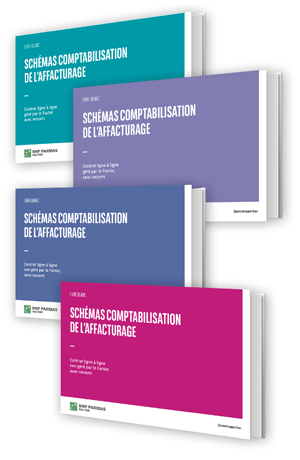
 Risks, strategy, financing… Exporting that is simpler than it looks
Risks, strategy, financing… Exporting that is simpler than it looks
Risks, strategy, financing… Exporting that is simpler than it looks.
Faced with this alarming observation, we joined forces with Altares and Moci to draw up a white paper to provide exporting SMEs with a real insight in good export practices.
In it you will find:
- 10 country listings allowing you to target your export countries,
- A practical 10-step guide so that nothing is left to chance
- Testimonials from exporters who give us the pleasure of sharing their experiences.
Download this white paper now to develop your international business with peace of mind.
 Practical guides - Accounting for factoring
Practical guides - Accounting for factoring
We are pleased to present these “Accounting for factoring” guides, which are designed to better serve the companies we help in the day-to-day running of their businesses.
By giving you examples, we hope to provide you with a guide on how the various transactions linked to your factoring contract are accounted for.
These guides are now available depending on the contract you have with us:
- Line by Line managed by the Factor with recourse
- Line by Line managed by the Factor without recourse
- Line by Line not managed by the Factor with recourse
- Line by Line not managed by the Factor without recourse
- Balance not managed by the Factor with recourse
- Balance not managed by the Factor without recourse
- Data Factoring not managed by the Factor with recourse
- Data Factoring not managed by the Factor without recourse
A managed contract means that the Factor collects the payments and debt and provides protection against non-payment.
An unmanaged contract is also referred to as unmanaged notified factoring, delegated factoring or semi-confidential factoring. The company retains the management and collection of its receivables.
In the case of a contract with recourse, the factor may claim reimbursement of the finance on unpaid receivables from the company.
If it is a contract without recourse, it is accompanied by a credit insurance option. In this case, the receivables are said to be “approved” and, in the event of non-payment, the Factor may not claim reimbursement from the company.
These guides, made available by BNP Paribas Factor and produced by Bricard, Lacroix et Assoicés under the supervision of Agnès Bricard, enable you to effectively account for your factoring transactions with us.
We hope you find them useful.
Download the guide for your contract now so you can find out everything you need to know about accounting for your factoring transaction.
 Payment delays, cash flows… real life issues for construction companies
Payment delays, cash flows… real life issues for construction companies
The white paper “Payment delays, cash flows… real life issues for construction companies” is based on two studies run by BNP Paribas Factor, in partnership with Altares and Infopro Digital.
In this context, more than 800,000 company balance sheets, of which 190,000 confidential, were analysed, and more than 500 professionals in the sector were asked about their experiences and perception of payment deadlines.
Among the main lessons were:
- 70% of construction companies face payment delays on a regular or occasional basis
- Almost a quarter of those state that 10% of their invoices go unpaid.
- 40% of professionals in the sector have had to leave a construction site due to lack of cash flow.
Find out more on the findings of the survey
Through testimonials and advice from construction professionals, this white paper also provides solutions that are often unrecognised as essential to business development.
Discover the 1st white paper dedicated to payment delays in the construction industry now!